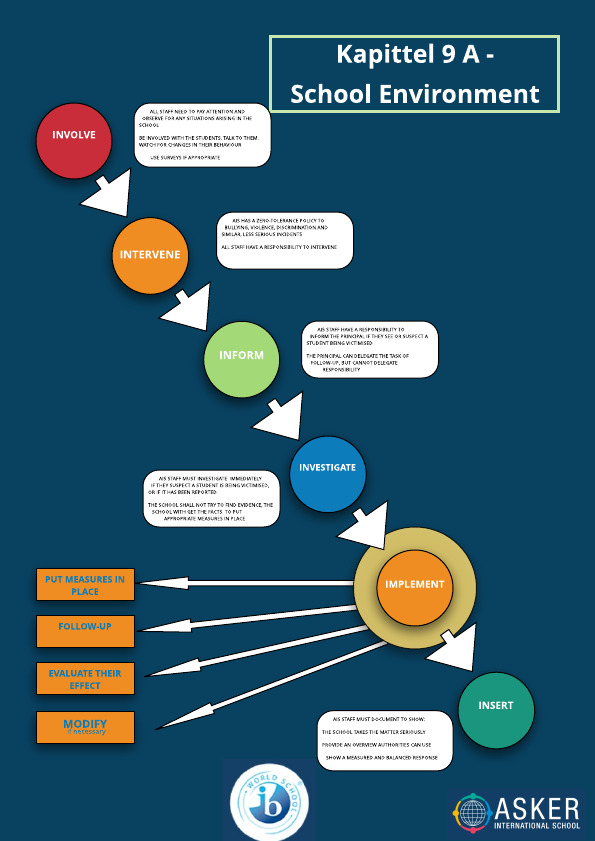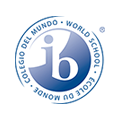Anti-bullying policy
Asker International School Anti-Bullying policy (next revision May 2023. Previous revision May 2021)
https://lovdata.no/nav/lov/1998-07-17-61/kap9a - Paragraph specifically related to the School environment.
Definition
Bullying
Bullying is unwanted, deliberate behaviour that involves a real or perceived power imbalance. The behaviour is repeated, or has the potential to be repeated, over time. Bullying includes but is not limited to actions such as making threats, spreading rumours, attacking someone physically or verbally, ridicule and excluding someone from a group on purpose. Bullying can be covert or overt. The definition of bullying applies to all members of the school community.
Cyber-bullying
Cyber-bullying is bullying that takes place using electronic technology. Electronic technology incorporates not just hardware but also software. Electronic technology includes devices and equipment such as cell phones, computers, and tablets as well as communication tools including social media sites, text messages, chat, and websites.
Examples of cyber-bullying include hurtful text messages or emails, rumours sent by email or posted on social networking sites, and embarrassing pictures, videos, websites, or fake profiles.
The area of cyber-bullying is not limited to the school building but extends to into the greater community. This is because acts of cyber bullying can stem from a different environments but still have significant consequences at school Cyber-bullying is 24*7 phenomenon.
A simple acronym that can be used for identifying bullying behaviour. Is the act:
R – Repeated (not a once-off comment)?
O– Overpowering (used to diminish someone)?
P – Planned (purposeful or intended)?
Our philosophy
All members of our school community are responsible to take affirmative action and create a supportive and inclusive environment. We want a secure learning environment and as such respond to a framework of rules and policies where we can feel confident to express ourselves, where everyone feels safe. Consequences need to be fair, balanced and based on a proper investigation. Accusation is also a serious matter and everyone in the school community has a responsibility to judge carefully before taking action. All aspects must be viewed before a conclusion can be reached. Our philosophy for action can be summarised as: Firm, Fair, Consistent.
Purpose of Anti bullying policy
The purpose of the anti-bullying policy is to help create an environment where everyone feel safe and know that their culture, ethnicity and individuality will be safeguarded. The policy is designed to help create an awareness of what bullying is and what measures should be taken.
Our beliefs
Asker International school expects students to conduct themselves in a manner in keeping with their levels of development, maturity, and demonstrated capabilities with a proper regard for the rights and welfare of other students, school staff, volunteers, and contractors.
Asker International school expects adults to conduct themselves in a manner in keeping with their levels of development, maturity, and demonstrated capabilities with a proper regard for the rights and welfare of other students, school staff, volunteers, and contractors
Asker International school believes that a comprehensive curriculum must be developed at the school that addresses such matters and helps students understand the required traits for global citizenship. Critical skills include anticipating consequences of choices, making informed decisions, communicating effectively, resolving conflicts, and developing cultural competency.
Asker International School believes that all adults in the school community have a responsibility to be aware of how they deal with events as they occur and how they speak to others in the school.
Asker International School believes that self-respect and respect for others are essential traits for individual success and the establishment of a supportive school culture.
Asker International School believes that the best consequence is one that is designed to (1) support students in taking responsibility for their actions, (2) develop empathy, and (3) teach alternative ways to achieve the goals and the solve problems that motivated the unwanted behaviour.
Asker International School believes that the bystander plays a crucial enabling role and that bystander support encourages bullying behaviour. We believe that the absence of bystander support significantly reduces the likelihood of bullying.
Asker International School believes that parents have a responsibility to educate their children as to what is acceptable behaviour in line with school policies. Students must learn that expectations of behaviour change from environment to environment.
Asker International School believes that we are responsible for everyone's welfare in the school and should never walk past what we deem inappropriate behaviour in the school community.
Asker International School believes that cyber-bullying is a significant area that extends into other environments other that the school and as such cyber-bullying constantly poses a threat to the well-being on an individual/group.
Asker International School believes that false accusation can be a strategy used for bullying another individual/group and consequences may equate to bullying in itself.
Practices
At Asker International School we:
Have ethics as a central theme in our units at the school.
Have a house system that mixes grade levels together with the intent of creating a culture of tolerance and support in the school.
Address matters that take place in the school such as bullying through regular whole school and class activities such as assemblies, circle time and club time.
Have a reward system as a parallel to the house system where students can see the benefit of positive behaviour.
Have a discipline policy to ensure that our response to unacceptable behaviour is fair to parties within the school.
Have weekly staff sessions where we have the opportunity to discuss matters that occur in the school and identify strategies to remedy these matters before they escalate.
Have a system for recording incidents related to student behaviour in an effort to ensure clear communication and overview to staff.
Have an open plan facility to increase transparency in the school.
Have open channels of communication to allow children who perceive themselves as victims of bullying to be heard and taken seriously.
A buddy system for new students to ensure that they have the opportunity to interact and adjust to their new school environment.
Teach children about the responsible use of ICT
-
- Implement what is known as Tverrfaglig samarbeidssystem (TFS). The TFS is a collaborative system where representatives from different organisations discuss student welfare and development. Meetings will take place on a monthly basis. Parents, principal, school nurse are among participants.
Consequences
In the event of minor instances the teacher will endeavour to resolve the matter in the classroom without further intervention required and identify whether or not the case at hand is bullying or an invidual, isolated incident. The majority of instances should be resolved in this fashion. In the event of further consequences as stipulated above parents will be notified and possibly invited to the school to discuss the matter in further detail.
Factors for Determining Consequences
• Age, development, and maturity levels of the parties involved.
• Degree of harm (physical and/or emotional distress).
• Surrounding circumstances.
• Nature and severity of the behaviour(s).
• Incidences of past or continuing pattern(s) of behaviour
• Relationship between the parties involved.
• Context in which the alleged incidents occurred.
Examples of Consequences
• Cautioning and counselling against such behaviour.
• Participation in a guided reflection process designed to teach alternative
behaviour.
• Temporary removal from the classroom.
• Loss of privileges.
• Classroom or administrative detention.
• Referral to principal.
• In-school suspension during the school week.*
• Out-of-school suspension.*
• Legal action – in extreme cases official organisations may need to be contacted.
*Ref. Opplæringsloven § 2-10. Bortvising, Privatskoleloven § 3-10
Strategies for Environmental Change
• Teachers get the students to engage in activities to reflect on their behaviour. Such activities could include reflection sheets, role-play, presentations, quizzes or other.
• An annual survey will be conducted to review the school environment with a specific focus on bullying.
• Review of school policies at the beginning and end of each academic year.
• Schedule review will take place annually.
• Supervision during break times and pre- and post- school day.
• General professional development programs for certified and non-certified staff
• Parent conferences each term
• Referral to family counselling
• Involvement of parent organization.
• Involvement of community-based organizations
• Engage in community awareness events and planning sessions
References
www.michigan.gov
http://www.browardschools.com/
http://www.stopbullying.gov/
http://www.schoolsecurity.org/trends/bullying.html
http://www.asker.kommune.no/Barn-unge-og-familie/Bekymringer/Tverrfaglig-samarbeid/ - Information specific to the TFS plan mentioned earlier can be found here.
https://lovdata.no/dokument/NL/lov/2003-07-04-84#KAPITTEL_3 - Privatskoleloven
https://lovdata.no/dokument/NL/lov/1998-07-17-61#KAPITTEL_2 - opplæringsloven
ADDITIONAL - School poster highlighting the steps taken to ensure a positive school environment. Originally created in October 2017 after a presentation from Statsforvalteren on changes in legislation.






